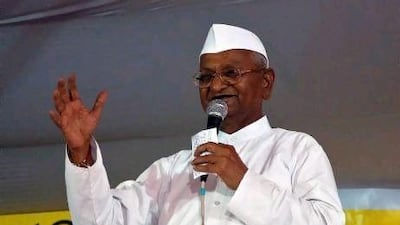NEW DELHI // When Anna Hazare began a fast last summer to protest against government corruption, thousands attended his demonstration and thousands more participated in parallel rallies across India.
Earlier this month, after another 10-day hunger strike failed to push the government into instituting a new corruption inquiry, Mr Hazare announced that his team would pursue an alternative route - form a political party and stand in elections.
But the Indian political system often proves an inhospitable place for independent candidates and unallied parties born out of movements driven by a personality.
Campaign funding is a major hurdle, said Anil Bairwal, the convener of the non-profit Association for Democratic Reform.
Although India's Election Commission sets limits on campaign expenditure - about 4.8 million rupees (Dh3.2m) per constituency in big states during national elections - large parties routinely exceed these limits with the help of unaudited donations or untraceable spending in cash.
Mr Bairwal believes candidates illegally spend an average of 50 million rupees for a seat in the lower house of parliament.
Meera Sanyal, a banker who ran and lost as an independent candidate from south Mumbai during the 2009 general elections, said the logistics of elections favoured established parties. "The sheer size of our constituencies gives an advantage to anyone who can access a large campaign team," she said.
The composition of Mr Hazare's party has yet to be revealed, but he has confirmed that he would not contest the elections himself.
Instead, the as yet unnamed party will be driven by Mr Hazare's lieutenants, such as Arvind Kejriwal, a former civil service officer. Mr Kejriwal has promised a party with transparent sources of funding and candidates chosen by its public.
While Mr Hazare's movement forced the Congress-dominated United Progressive Alliance government to submit to introduce an anti-corruption bill into parliament last year, the legislation has not been passed.
Outlining the party's ambitions, Mr Kejriwal, quoted on his group's Facebook page, said: "This movement is moving from the roads to the [arliament. The people will make the manifesto of this party."
In The Hindu newspaper yesterday, Yogendra Yadav, a political analyst who has publicly endorsed Mr Hazare's campaign, acknowledged that history did not offer encouraging odds for the new party.
"Attempts to establish political parties representing [people's] movements [have] failed to cross the high threshold of viability in our electoral system," Mr Yadav wrote, citing examples. "To give effect to their political agenda, these movements remained dependent on the very political establishment they critiqued and struggled against."
Karthik Chandra, the head of the research and advocacy division of Lok Satta, a small 6-year-old party that started off as a citizen's movement in Andhra Pradesh, said broad support - as Mr Hazare has enjoyed - does not always translate into electoral votes.
Lok Satta has contested in state and local-body elections in India with modest success. Like Mr Bairwal, Mr Chandra raised the issue of campaign expenditure.
"The smaller parties have to fight … voter bribery," Mr Chandra said. "The bigger parties' candidates have the kind of money where they will offer short-term inducements like liquor, money, laptops or bicycles, instead of giving real, long-term governing solutions."
The political system itself, Mr Chandra said, is propped up by - and thus favours - the "distorted powers" of the old-guard parties such as Congress and the Bharatiya Janata Party.
For these reasons, many doubt that Mr Hazare's party will find the politicians it needs to maintain its image and achieve its goals.
"There are no guarantees that even if the country was to elect a party based on an anti-corruption agenda, that those who will become politicians will not become corrupt," said Debatra Ghosh, a 22-year-old advertising executive in Mumbai.
There is little doubt, Ms Sanyal said, that a hunger for new political solutions exists.
During her campaign in Mumbai in 2009, she said: "I was touched by the encouragement I got from ordinary Mumbaikars, who expressed their frustration with the corruption and ineptitude of the established political system."
Follow
The National
on
& Samanth Subramanian on
sbhattacharya@thenational.ae
Follow
The National
on
& Surya Bhattacharya on

